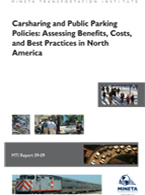- 408-924-7560
- mineta-institute@sjsu.edu
- Donate
Greenhouse Gas Emission Impacts of Carsharing in North America
This report presents the results of a study evaluating the greenhouse gas (GHG) emission changes that result from individuals participating in a carsharing organization. The principle of carsharing is simple: individuals gain the benefits of private vehicle use without the costs and responsibilities of ownership. Carsharing is most common in major urban areas where transportation alternatives are easily accessible. Individuals typically access vehicles by joining an organization that maintains a fleet of cars and light trucks deployed in lots located within neighborhoods, public transit stations, employment centers, and colleges/universities. In this study, the authors conducted a survey of carsharing members across the country to develop a robust estimate of GHG emission impacts resulting from carsharing. The results illustrate the annualized change in GHG emissions among members within the largest carsharing organizations across Canada and the United States. GHG emissions from transportation are lower due to carsharing. The average change in emissions across all respondents is -0.58 t GHG per household per year for the observed impact, and -0.84 t GHG per household per year for the full impact. However, it is important that this result is understood in the context of the broad diversity of carsharing impacts. While carsharing does facilitate lower emissions, the reduction is not generalizable across all members or even a majority of members. Rather, carsharing as a system facilitates large reductions in the annual emissions of some households, which compensate for the collective small emission increases of other households. The results also show that respondent households exhibit significant reductions in vehicle ownership after joining carsharing.
ELLIOT W. MARTIN, PhD
Elliot William Martin is a post-doctoral research engineer at the Transportation Sustainability Research Center (TSRC) within the Institute of Transportation Studies at UC Berkeley. He holds a PhD in civil and environmental engineering from UC Berkeley, a dual Masters in Transportation Engineering and City and Regional Planning at UC Berkeley, and a pair undergrad degrees from Johns Hopkins University in economics and computer science. During his time as a graduate student at TSRC, Dr. Martin contributed to a variety of projects at TSRC and the Innovative Mobility Research (IMR) group, which he joined in 2005.
Dr. Martin has co-authored a number of publications in peer-reviewed journals and conference proceedings. Prior to his return to graduate school, he worked as an assistant economist at the Federal Reserve Bank of Richmond.
SUSAN A. SHAHEEN, PhD
Susan Alison Shaheen holds a joint research appointment at the Transportation Sustainability Research Center (TSRC) and at the Institute of Transportation Studies-Davis. She is co-director of the transportation track of the Energy Efficiency Center at UC Davis and was honored as the first Honda Distinguished Scholar in Transportation in 2000. In October 2007, Dr. Shaheen became a research director at TSRC. She served as the Policy & Behavioral Research Program leader at California Partners for Advanced Transit and Highways from 2003 to 2007, and as a special assistant to the directors office of the California Department of Transportation (Caltrans) from 2001 to 2004. She has been a research associate with the Mineta Transportation Institute since 2004.
Dr. Shaheen has earned a PhD in ecology, focusing on technology management and the environmental aspects of transportation, from the University of California, Davis and an M.S. in public policy analysis from the University of Rochester. She completed her post-doctoral studies on advanced public transportation systems at UC Berkeley in July 2001. Dr. Shaheen has earned a variety of honors, including two national research awards for her contributions to a carsharing pilot program (2001) and a smart parking field test (2005). In May 2007, she received the Berkeley Staff Assemblys Excellence in Management? award in recognition of her leadership and mentorship.
-
Contact Us
San José State University One Washington Square, San Jose, CA 95192 Phone: 408-924-7560 Email: mineta-institute@sjsu.edu






